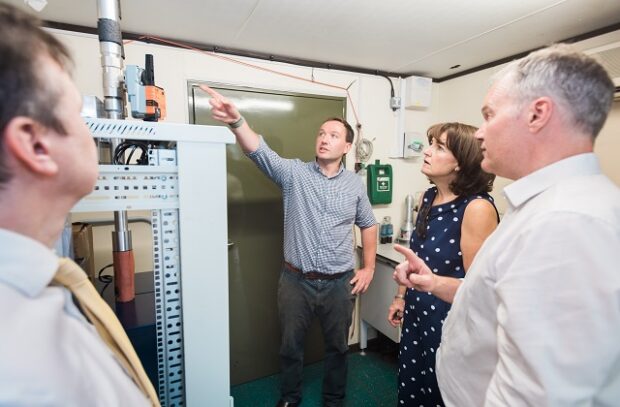
Clean Air Day is the UK’s largest air pollution campaign aiming to promote a shift in air quality awareness and to showcase that a future with cleaner air is both possible and desirable. Coordinated by Global Action Plan, Defra has remained a key and active partner of the campaign since 2017.
To mark the occasion, Agri-innovation and Climate Adaptation Minister Jo Churchill visited the Defra-funded Imperial College air quality supersite on the London Marylebone Road to learn about the site’s advanced monitoring technology and its use in informing the public about air pollution and the significant risks it poses for public health.

The Minister met with Dr David Green, Senior Research Fellow at Imperial’s Environmental Research Group, Dr Ian Mudway, Senior Lecturer in the School of Public Health, and Imperial PhD student William Hicks who discussed his research on non-exhaust emissions impacting air quality.
Agri-innovation and Climate Adaptation Minister Jo Churchill said:
Clean Air Day is an important opportunity for us to both reflect and focus our attention onto air pollution.
“It was great to meet with the team from Imperial College to learn about the vital work being carried out to help shape our understanding of the impact of dirty air on health.
“We will continue to work closely with local authorities, campaigners and researchers to show the leadership needed to create a future in which we all can enjoy the benefits of cleaner air.
Dr David Green, Senior Research Fellow at Imperial’s Environmental Research Group, said:
It was great to show the Minister our work at the Marylebone Road air quality research station and emphasise how the measurements we make are used to inform our understanding of people’s exposure to poor air quality, and influence public policy to reduce the health impacts of air pollution.
Yesterday, the National Audit Office published its report on the Government’s approach to air quality.
In response, a Government spokesperson said:
We welcome the findings of the NAO report which rightly highlights the progress made by the Government whilst also recognising the challenges we face.
“Air pollution at a national level continues to reduce significantly, with nitrogen oxide levels down by 44 per cent and PM2.5 down 18 per cent since 2010.
“We have committed nearly £900m to tackle air pollution and improve public health. We are also setting stretching and ambitious targets on air quality through our world leading Environment Act, with a live public consultation showing our ongoing desire to engage with the public on this crucial issue.
Photos credit: Imperial College London
1 comment
Comment by John W. Baxter posted on
If we did not burn so many tree equivalents of wood pellets at Drax, I might have supported government energy policy but have come to the conclusion that our government does not understand basic mathematics when it comes to energy equivalent accounting.
15 million trees burned does not equate to 15 million trees planted.